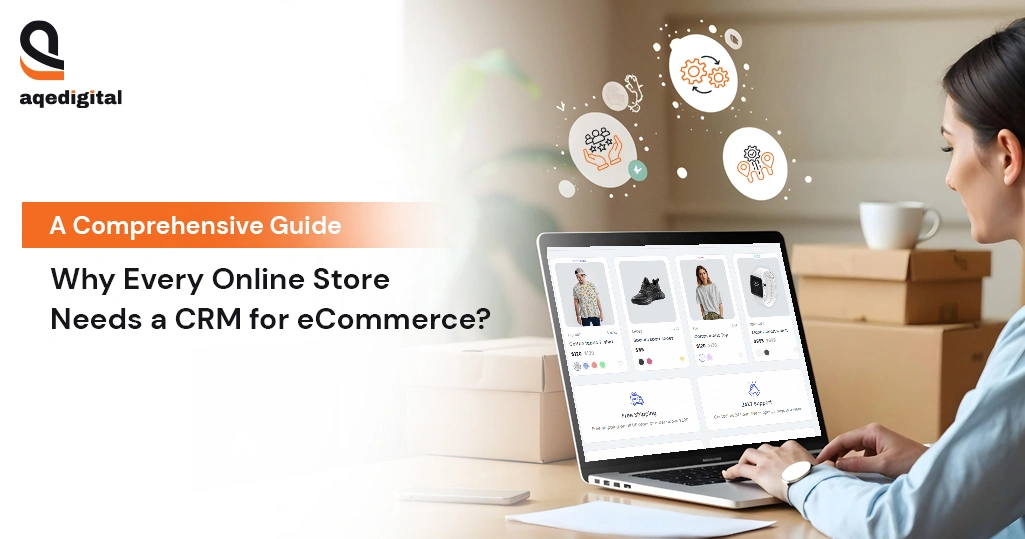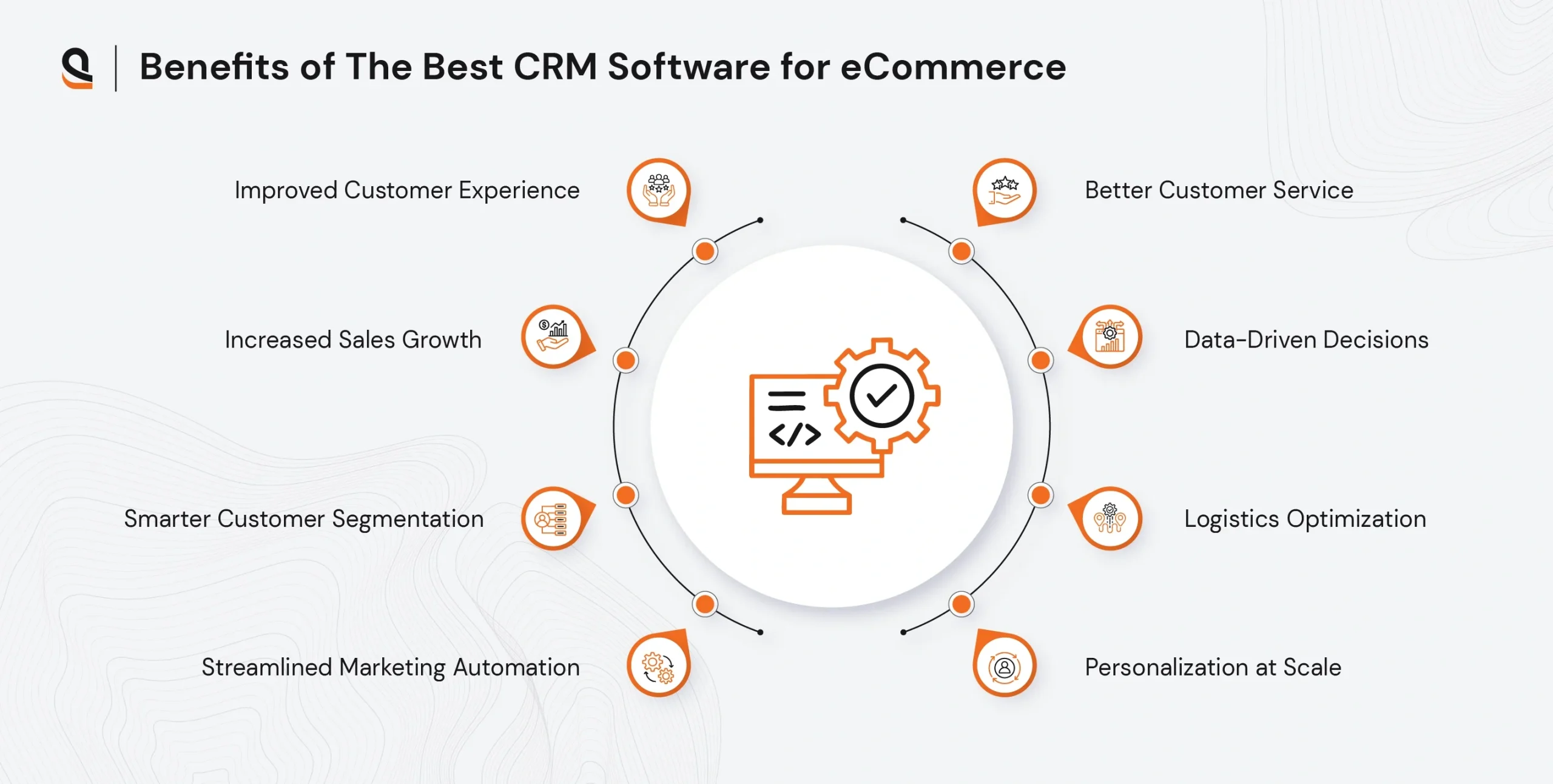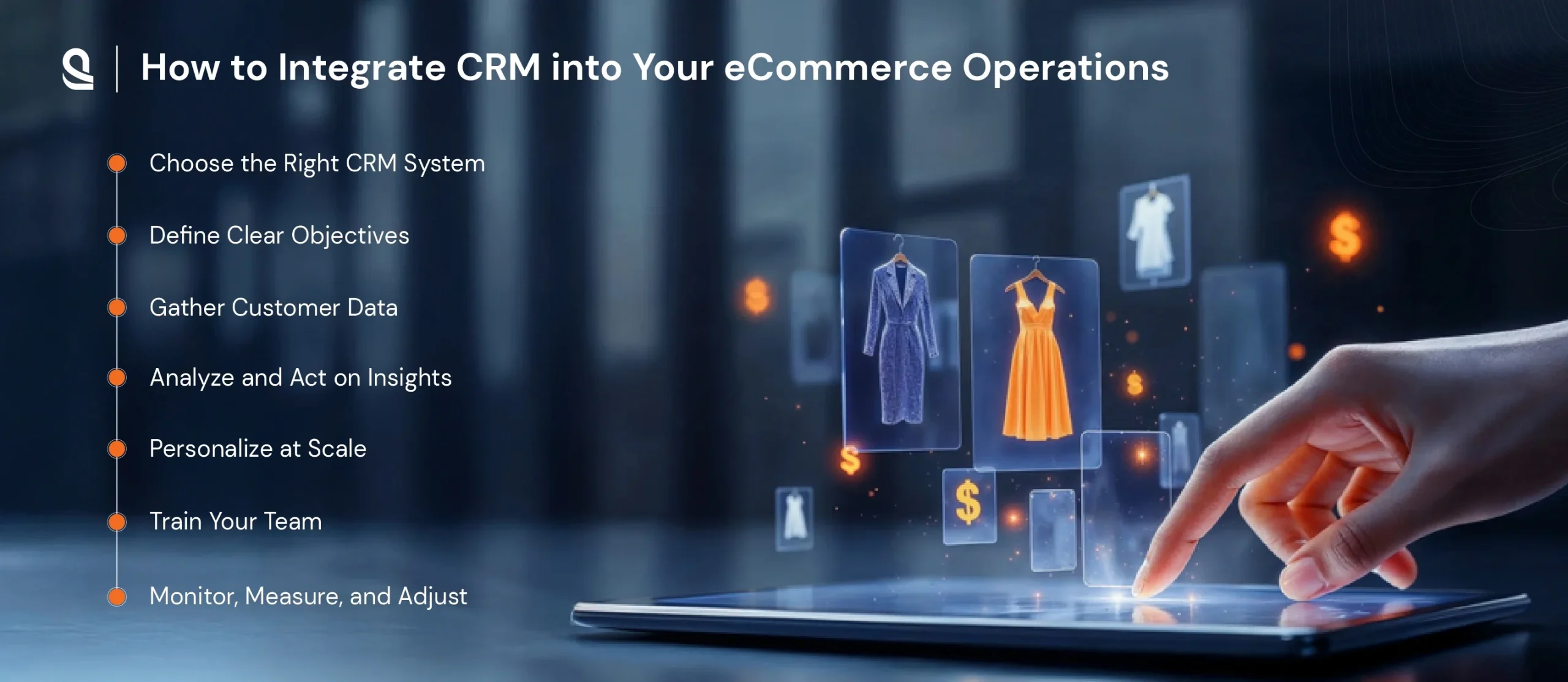Consumers quietly abandon nearly 70% of online shopping carts, especially when shipping costs are introduced late in the purchasing journey. Plus, customers often leave the website after browsing five product pages or emailing for help by the time you reply. The product might already be out of stock.
This is where CRM (Customer Relationship Management) software can be of great help. With the right CRM for eCommerce, you can track views, clicks, communication habits, and drop-off points across the buyer journey. Missing out on these insights means losing billions in recoverable sales.
However, most eCommerce business owners, CTOs, and CIOs experience decision creep due to the following questions.
- Why is CRM for eCommerce important?
- Which one to choose?
- How is it different from conventional CRM?
This article is your guide to doing CRM software development the smart way, with zero guesswork. It answers all your queries and provides tips on selecting the best CRM for eCommerce operations. Let’s first start with the basics of eCommerce CRM.
What is an eCommerce CRM System?
An eCommerce CRM system is a tool that helps online businesses collect, organize, and analyze customer data across platforms. It centralizes customer information like purchase history, browsing behaviour, and preferences, allowing companies to create targeted campaigns for an eCommerce business.
eCommerce CRM integration helps attract new customers, retain existing ones, and reduce wasted effort. A CRM for eCommerce gives you insights to build loyalty programs, personalize offers, and boost conversions.
With smart CRM software development, these platforms don’t just store data; they help you act on it. And when you leverage eCommerce CRM integration, all your systems (store, marketing, and support) work together seamlessly, turning raw data into predictable growth.
Difference Between Traditional and eCommerce CRM Platforms
Traditional CRM tools are excellent for logging customer details, such as contact preferences, purchase history, and sales leads, all in one place. They help teams stay organized and ensure that customers receive the appropriate level of attention. However, the issue is that traditional CRM was not designed for the constantly connected world of online retail.
Unlike traditional systems, it not only tracks leads but also analyzes shopping behaviours, click-through rates, and conversions in real-time. It operates 24/7, uncovering insights that enable you to personalize offers, enhance customer retention, and recover abandoned carts.
With advanced CRM software development, eCommerce CRM evolves beyond mere data collection. It creates experiences that foster loyalty and increase sales. When you choose the best CRM for eCommerce, you are not only managing customers, but you are also building lasting, profitable relationships.
Why Traditional CRMs Don’t Work for eCommerce
Most CRMs were built with B2B in mind, targeting long sales cycles, smaller customer bases, and account managers who need to track every deal. But that’s not how eCommerce works. And if you’re curious about how physical retail is also evolving, check out our blog on how AI is enhancing the in-store shopping experience.
If you’re running an online store, you’re managing thousands (maybe millions) of fast-moving customers across dozens of touchpoints such as your website, email, SMS, social, and even loyalty programs.
Traditional CRMs simply can’t keep up. They create data silos, miss personalization opportunities, and force your team to spend more time cleaning data than building customer relationships.
That’s why CRM for eCommerce exists. It’s designed for speed, scale, and personalization at every touchpoint. With smart eCommerce CRM Integration, your marketing, support, and sales data all sync in real-time, giving you a clear view of your customers.
Top Benefits of Using CRM Software for eCommerce Growth
Customers today expect more than just a smooth checkout process. They want personalized offers, quick responses, and consistent experiences across every channel. By connecting CRMs with broader retail IT solutions, businesses can align marketing, customer service, and operations for a truly seamless experience.
Here’s a deeper look at the significant benefits:
1. Improved Customer Experience
Customer experience is everything. A CRM collects every piece of data, from browsing history to purchase frequency to preferred contact methods, and turns it into actionable insights. Instead of blasting the same generic campaigns to everyone, you can design personalized strategies that feel tailor-made for each shopper.
For example:
- A first-time visitor might get a welcome discount.
- Frequent buyers could receive exclusive loyalty perks.
- An inactive customer might be nudged with a win-back campaign.
2. Increased Sales Growth
Not all customers are equal. Some will always be more valuable than others. A CRM helps you identify those high-value buyers and target them with upsell and cross-sell opportunities.
With purchase data and behaviour tracking, you can design campaigns that speak directly to what customers actually want. Think “Customers who bought this also loved that” or bundle deals based on their order history. The result? Higher average order values and repeat purchases.
Plus, CRMs give you visibility into what’s working and what’s not. You’re not guessing, you’re making decisions based on data, which leads to consistent sales growth.
3. Smarter Customer Segmentation
One-size-fits-all marketing no longer works. Segmentation is where modern marketing wins. A CRM enables you to segment your audience based on demographics, past purchases, browsing behaviour, and engagement level.
This means you can:
- Send VIP offers to your top spenders.
- Create tailored discounts for first-time buyers.
- Launch targeted campaigns for customers who only shop during holidays.
By speaking to the right people at the right time, you reduce wasted ad spend and dramatically increase conversions. Segmentation makes your marketing sharper, leaner, and more effective.
4. Streamlined Marketing Automation
CRMs automate the processes that would otherwise slow your team down with repetitive tasks. Think automated email drips, abandoned cart reminders, social media triggers, and retargeting campaigns.
With eCommerce CRM Integration, all your tools, such as email, ads, support chat, and sales systems, are integrated and work together, eliminating disconnected data and guesswork. Customers receive a unified and consistent experience across every touchpoint, while your team saves time and focuses on strategy rather than manual work.
5. Better Customer Service
Nobody likes repeating themselves to support agents. With an eCommerce CRM, your team can view a comprehensive history of customer interactions, including past purchases, tickets, emails, and chats, in a fraction of the time. That means faster response times, less frustration, and more personalized service.
CRMs don’t just react; they help you prevent problems. By tracking recurring issues, you can identify and address the root causes before they affect more customers. Better service means happier buyers, and happier buyers are the ones who stick around.
6. Data-Driven Decisions
CRMs provide you with complex numbers, such as conversion rates, purchase patterns, and engagement trends, enabling you to make more informed business decisions.
Want to know which products are trending? Which campaigns actually drive sales? Which customer segments are most profitable? Your CRM has the answers.
This data-driven approach helps you refine your pricing, improve your offers, and double down on what’s working while cutting what’s not. It’s like having a built-in business advisor powered by customer insights – the kind of customer Insights for eCommerce growth that turn raw data into smarter decisions.
7. Logistics Optimization
eCommerce isn’t just about selling, it’s about delivering. A CRM helps you understand where demand is coming from, when it spikes, and which products need to be stocked in advance.
With these insights, you can:
- Avoid oversupply and stockouts.
- Improve delivery times by planning inventory smarter.
- Reduce logistics costs by aligning supply with actual demand.
For seasonal businesses, this is a game-changer. Imagine always having the right products in the right place at the right time; that’s the efficiency CRMs bring to your operations.
8. Personalization at Scale
Personalization used to mean sending a customer’s name in an email. Not anymore. Shoppers expect tailored recommendations, dynamic discounts, and loyalty perks that feel designed just for them.
For example:
- A customer who regularly purchases skincare products might receive personalized recommendations for new arrivals in the same category.
- Someone who abandons a cart could receive a follow-up email offering a small discount to encourage them to make a purchase.
- Loyal buyers can be rewarded with exclusive early access to new collections.
How to Choose the Right CRM for an eCommerce Store?
With dozens of platforms available, it’s easy to become overwhelmed. The good news? If you ask the right questions up front, the decision becomes a lot simpler. Many brands also seek expert CRM consulting to ensure they select the right platform and maximize ROI from their implementation.
1. What’s My Budget?
Start with the basics: how much are you ready to invest? Free CRMs can be tempting, but they often lack advanced features such as automation, AI insights, and in-depth reporting. Paid platforms frequently deliver a better ROI because they help you save time, scale faster, and drive more revenue.
2. Does It Integrate With My Current Tech Stack?
Your CRM should play nicely with the tools you’re already using. This is where eCommerce CRM Integration becomes critical. If the system can’t sync customer data seamlessly across your store, marketing, and support channels, you’ll end up with messy silos instead of insights.
3. What Features Do I Really Need?
Don’t get distracted by shiny add-ons. Create a list of must-haves, such as marketing automation, segmentation, mobile access, or a built-in content management system. Then rank them in order of priority. This clarity makes it easier to match your needs with the right platform.
4. Can It Scale With My Business?
A CRM should not only meet your current needs but also adapt as your business grows. Choose a solution that supports customization, integrations, and upgrades to ensure long-term scalability without requiring a complete system overhaul.
5. How Easy Is It to Use?
A robust CRM is worthless if your team hates using it. Test the interface. Check the onboarding process. Ask about training and support. The smoother the adoption, the faster you’ll see results.
Step-by-Step Guide to CRM Integration in eCommerce
A CRM won’t magically boost your sales the moment you install it. To make it work, you need a strategy. Integration isn’t just about plugging in software; it’s about weaving customer insights into every part of your business.
Here’s a step-by-step roadmap to make eCommerce CRM Integration smooth and impactful:
1. Choose the Right CRM System
Not all CRMs are built for online retail. Look for one that syncs with your platform (Shopify, WooCommerce, Magento), scales with your business growth, and integrates seamlessly with the tools you already use.
2. Define Clear Objectives
Don’t just “get a CRM.” Ask yourself: Do you want to improve retention? Increase repeat purchases? Automate customer service? Your goals will shape how you use the system.
3. Gather Customer Data
Your CRM is only as powerful as the data you feed it. Pull information from your website analytics, social media, email campaigns, and surveys. The more you know about buying behaviour, the better you can tailor experiences.
4. Analyze and Act on Insights
Data without action is just noise. Use your CRM’s analytics to spot trends like which products drive repeat purchases and turn those insights into targeted campaigns and smarter decisions.
5. Personalize at Scale
Leverage your CRM to deliver personalized emails, custom discounts, and product recommendations. Customers feel seen, and you boost conversions.
6. Train Your Team
A CRM only works if your team actually uses it. Invest in training so staff can log data correctly, interpret insights, and understand how it benefits both them and the customer.
7. Monitor, Measure, and Adjust
CRM isn’t set-it-and-forget-it. Track KPIs like customer lifetime value, retention rates, and satisfaction scores. Utilize these metrics to refine your campaigns and continually enhance them over time.
The Role of CRM Software Development
Every eCommerce brand has unique needs, which is why off-the-shelf tools often fail to meet these needs. That’s where CRM software development comes in. Custom solutions enable you to build workflows, dashboards, and automation tailored to your business, ensuring your CRM isn’t just a database.
How AQe Digital Can Help You Build a Custom CRM for eCommerce?
The customer is at the core of any eCommerce store, and maintaining a strong relationship with them is crucial to drive growth, sales, and stay competitive. CRM for eCommerce does more than just preserve customer relationships; it provides complete visibility and control over operations, business performance, data, and workflow.
At AQe Digital, we offer comprehensive digital solutions, spanning AI/ML model development to CRM software development. Whether you want to boost your sales or streamline your eCommerce operations, contact us to discover how our services can help you establish a strong and efficient customer relationship.
FAQs
CRM is crucial for eCommerce because it centralizes customer data and provides insights into browsing behaviour, purchase patterns, and engagement. This helps online stores personalize offers, recover abandoned carts, improve retention, and build long-term loyalty, leading to higher sales and better customer experiences.
Unlike traditional CRMs, an eCommerce CRM operates 24/7, collecting real-time data such as clicks, shopping behaviours, abandoned carts, and conversions. It’s designed for scale and speed, enabling personalization, marketing automation, and seamless customer engagement across multiple online channels.
The main benefits include improved customer experience, higher sales growth, smarter segmentation, automated marketing, better support, data-driven decision-making, logistics optimization, and personalization at scale. Together, these features help eCommerce businesses drive repeat purchases and increase customer lifetime value.
Integrating CRM with your online store, marketing tools, and support systems ensures complete visibility of customer journeys. This allows businesses to trigger personalized campaigns, automate abandoned cart reminders, and identify cross-sell opportunities, turning raw data into revenue growth and long-term retention.
To select the right eCommerce CRM, assess your budget, required features, scalability, integration with existing tech stack, and ease of use. Many businesses also opt for custom CRM software development to ensure the platform fits their unique processes and maximizes ROI.




